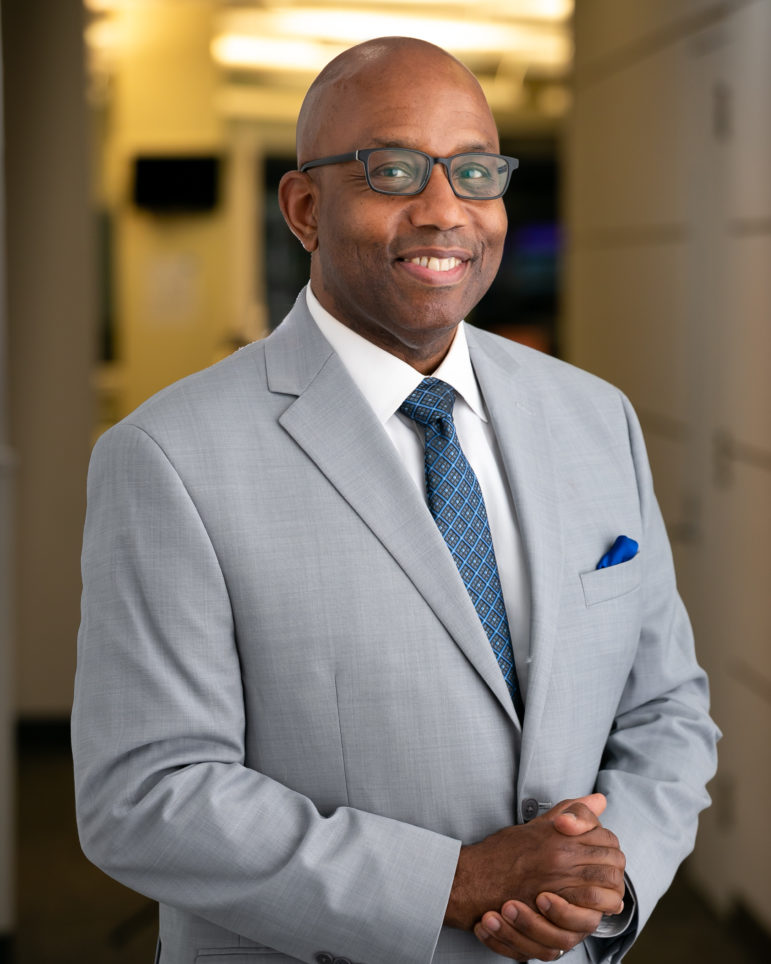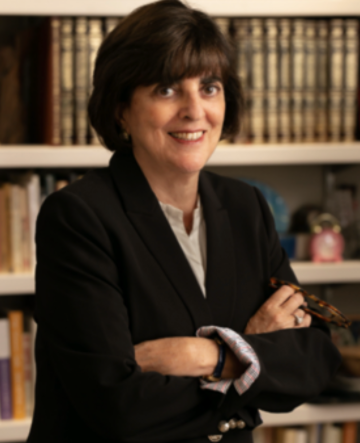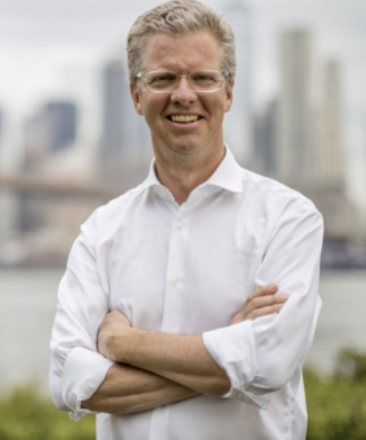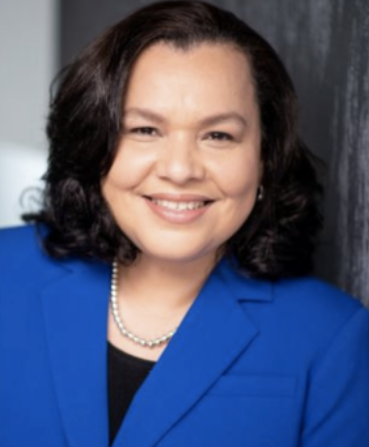This Oct. 26 marks City Limits’ 46th anniversary of informing and empowering New Yorkers with local investigative journalism.

This is a sponsored post on behalf of the City Limits’ annual Gala
This Oct. 26 marks City Limits’ 46th anniversary of informing and empowering New Yorkers with local investigative journalism. Help us celebrate this milestone to ensure we can continue providing impactful, thorough reporting on the city’s most vital issues including housing, homelessness, climate change and immigration.
While we have sold out tickets for our Gala celebration, every donation helps our cause. Donate today on behalf of our 2022 City Limits Gala & Hall of Fame Induction Ceremony honorees, and read more about them below.
Errol Louis
Host, “Inside City Hall,” on Spectrum News NY1

Adi Talwar
Aug 3, 2022: Errol Louis at his NY1 Office on 15th Street in ManhattanNew Yorkers know Errol Louis.
For more than a decade, he’s been delivering need-to-know political updates as host of NY1’s primetime news show “Inside City Hall,” and opining on policy as a columnist, first for the New York Daily News and more recently for New York magazine.
“It’s really all I was interested in,” Louis said of his preference for covering local politics, a skill he honed as an undergraduate at Harvard University, writing articles about Cambridge City Council spats for the school’s student newspaper, The Crimson.
But he always planned to return to New York City. Born in Harlem and raised in nearby New Rochelle, Louis’ father was an NYPD officer for more than 30 years, and like most kids growing up in the outskirts of the five boroughs, “the city was the center.”
“It’s the sun that the rest of us revolve around,” Louis said. He recalled how his father would give him money each week to run to the store for copies of the Daily News and New York Times, letting him spend the leftover change on comic books.
“I gradually started reading the papers,” he said. “They weren’t that different, frankly, from the comic books as far as you know, drama — good guys, bad guys, unexpected twists and turns.”
He got his start in New York journalism in the late 1980s, writing for outlets like the now-defunct City Sun as well as City Limits, where he penned book reviews for $75 a pop — not bad pay at the time for a young freelance reporter, he said.
“The models [then] were the Village Voice for a lot of cultural and sort of straight political reporting, and City Limits—especially for housing.” Another perk? “You got to keep the book.”
It was a challenging time for the city, but a good chance for a budding journalist looking to cover it. “There were a lot of interesting sort of political trends that were developing,” Louis said of that era. “And it was fun to be in the thick of it. What else could you ask for to be 21 years old, with a press pass?”
Louis became a regular political commentator for CNN, making more frequent appearances on the channel during the 2008 presidential election and covering the Obama administration after that. But he was still a local news guy at heart, so when a job hosting “Inside City Hall” opened up in 2010, he jumped at the chance.
He’s interviewed elected officials and big-name newsmakers, including two former presidents, Jimmy Carter and Bill Clinton. But some of his most memorable interviewees were native New Yorkers who’ve made a name for themselves, including documentary filmmaker Ken Burns (“I’m just a fanboy” Louis said of the director), biographer Robert Caro and longtime New York Post gossip columnist Cindy Adams.
In addition to his reporting roles, Louis has taught the craft for years, including at New York University and CUNY’s Craig Newmark Graduate School of Journalism, where he continues to urge budding journalists to enter the field, telling them to “just jump in.”
“It’s the only profession that is specifically mentioned and safeguarded by the U.S. Constitution,” he said. “The data tools and investigative tools that exist now are like nothing I ever could have imagined when I started in this business,” Louis added. “This is in some ways like a golden age of investigative reporting.”
We asked all our honorees: What’s a favorite place of yours in New York City?
“I have an unquenchable fascination with Harlem,” Louis said, saying he learned to read at the public library on 125th Street. “If you think about the political giants who were there, about Thurgood Marshall and Malcolm X and W. E. B. Du Bois and Adam Clayton Powell and Charlie Rangel and David Dinkins, and on and on. It’s really remarkable.”
Ester Fuchs
Director of Urban & Social Policy Program, Columbia University

Ester Fuchs was suited for a career in public service from an early age. When the editors of her eighth grade yearbook assigned every student a catchphrase they were known for saying a lot, hers was: “It’s not fair.”
“I always was concerned about that,” said Fuchs, the director of the Urban and Social Policy Program at Columbia University’s School of International and Public Affairs. “To me, getting involved in politics was about making the world a better place.”
Born in Manhattan and raised in Bayside, Queens, Fuchs’ interest in political science came from a place of pragmatism and problem-solving, she says: how can the government serve its residents most effectively? “The fundamental reason for a democracy is so that government better reflects the needs of ordinary citizens,” she said.
A graduate of CUNY Queens College, Fuchs earned a PhD from the University of Chicago before landing her first teaching job in urban politics at The University of Notre Dame and then at Barnard College.
In the early 2000s, as the city was still reeling from the Sept. 11 attacks, she was offered a policy advising role on Michael Bloomberg’s mayoral campaign. She was unsure at first — he was a billionaire with no real political experience, an unlikely candidate. But a sit-down talk about his political goals swayed her.
“I literally asked him, ‘Why do you think you should be mayor?’” Fuchs said. “He said, ‘Well, I think every child deserves a quality education. And it’s really broken and we need to fix it in the city.’ And I thought, yes, that’s exactly right.”
During her four years with the administration as special advisor for governance and strategic planning, she worked on a number of projects, reorganizing the city’s after-school care system and workforce development programs. Fuchs oversaw early development of what would become Access NYC, which streamlined applications for dozens of public benefits programs, like food stamps or Medicaid, into one online tool (residents previously had to apply separately for each, often through paper applications).
After leaving city government in 2005, Fuchs spearheaded the creation of WhosOntheBallot.org, a website where residents can enter their address and access voting information: where their poll site is located, its hours, and basic facts about the candidates running. “f you make it easy for people to vote, if you make information accessible, they are more likely [to],” she said.
More recently, she led Communities Speak, a project at Columbia University that surveyed residents and businesses across the city “to better understand the secondary impacts of COVID on high needs communities,” she explained. Researchers are using the data to create targeted policy recommendations around issues like child care.
The project encompasses what Fuchs has long valued in government practices: effectiveness, efficiency and her childhood quest for fairness. “Fairness is not just giving everybody the same thing,” she said. “That’s not fairness — fairness is figuring out where the need is, and then targeting the resources to where the need is.”
We asked all our honorees: What’s a favorite place of yours in New York City?
“My mother was born on the Lower East Side, my parents and my grandparents lived there,” Fuchs said. “I think it’s sort of a microcosm of the extraordinary transformations that cities undergo…It’s still changing. It’s still indicative of all the energy and the power of the city.”
Shaun Donovan
Fellow, Ford Foundation

For Shaun Donovan, a former HUD secretary and NYC Department of Housing Preservation and Development (HPD) commissioner, the city’s housing crisis in 2022 bears some similarities to what New York City was going through in the 1970s of his Manhattan childhood — but in many other ways, “the problems today are the opposite.”
Back then, New York had lost hundreds of thousands of residents who moved out to live elsewhere; today, despite short-lived pandemic fears over the “death of the city,” rents across the five boroughs have rebounded to record highs. Back then, the city’s main housing strategy was to rehab vacant and foreclosed properties; today, lawmakers argue over how best to add density and find space to build.
“The challenge now is inequality, and so many people being not only left behind, but being squeezed out,” said Donovan, calling the current affordable housing shortage “brutal.” Despite those differences, the recent rise in homelessness across the five boroughs — the city’s shelter population reached an all-time high in October — is “sadly familiar” to the New York of his youth, he said.
Donovan, who ran for mayor last year, knows something about housing. It’s been the core of his decades-long career, starting as an intern for the National Coalition for the Homeless in Washington D.C. after college. He’s worked for the Federal Housing Administration, at HUD during both the Clinton and Obama administrations, and led HPD under Mayor Bloomberg.
“Housing touches every part of somebody’s life,” he said. “Where you live determines where your kids go to school, what jobs you have access to, your health, your safety… That was a really profound lesson of the time I grew up in New York.”
Today, Donovan is bringing his years of experience to the Ford Foundation, where he was named a senior fellow in July. The role will have him working with the Biden Administration and other stakeholders to help plan and implement the Infrastructure Investment and Jobs Act, which earmarked $550 billion for new infrastructure across the country.
“It’s just a really remarkable moment,” Donovan said, saying the goal is to ensure funds are spent in a way that advances the country’s goals around climate resiliency and racial equity.
“To really make sure that this funding both reaches people in places that are so often left behind, and also make sure the money just doesn’t just go to the same old projects, just to repave the same roads and rebuild the same bridges,” he said. “That’s the opportunity of this moment. But it takes real innovation.”
We asked all our honorees: What’s a favorite place of yours in New York City?
“Grand Central,” Donovan said. “It’s the most beautiful room in the city, and a reminder of the amazing energy and diversity of my hometown, not to mention how damn fast New Yorkers walk!”
Lisette Nieves
President, Fund for the City of New York

In July, Lisette Nieves — a longtime public sector leader who currently heads the Fund for the City of New York — was confirmed by the U.S. Senate to the board of directors for AmeriCorps, the famed national service organization, after President Joe Biden nominated her for the post a year before.
It’s a fitting honor for Nieves, whose community service career dates back to her time as a student at Brooklyn’s John Dewey High School, where she volunteered in public schools and with homebound seniors as part of her coursework, and later as a Rhodes Scholar. “Public service is where you can see scale and impact faster than anywhere else,” she said. “It represents kind of the moral compass of a city.”
Nieves has been in her current role since 2020, following previous positions at NYU’s Steinhardt School, as the head of workforce development organization Year Up NY, and with the city’s Department for Youth and Community Development under Mayor Bloomberg.
At the Fund for the City of New York, which was founded more than half a century ago to “improve the quality of life for all New Yorkers,” her focus largely centers around supporting and strengthening the city’s vast network of nonprofits, which, via contracts with city agencies, carry out much of local government’s social safety programs. The industry employs almost 18 percent of New York City’s workers, according to the comptroller’s office.
“The nonprofit sector is not an ancillary sector. It’s actually central to delivering key and emergency services,” Nieves said.
The Fund supports some 85 nonprofit partners — which include organizations working in housing equity, arts and culture, criminal justice reform and more — through administrative and financial management, as well as with one of the nation’s largest nonprofit loan programs.
Last year, the Fund became the lead fiscal sponsor for the city’s first planned LGBTQ+ museum; It also supports The Right to Counsel NYC Coalition, which successfully spearheaded a campaign to secure free legal representation for low-income tenants facing eviction. Major city institutions, like the Food Bank for NYC and the Center for Court Innovation, got their starts with the Fund.
“We were part of that, and so I’m excited to be part of what I consider to be the next generation of those,” Nieves said. “Making real community impact — that’s why the Fund is here.”
We asked all our honorees: What’s a favorite place of yours in New York City?
“Prospect Park,” Nieves said. “It is one of the most diverse places you can go. And you just see people exhaling and enjoying themselves. It’s really a true treasure.”
Institution Honoree: A&E Real Estate

A&E Real Estate, a property management and real estate investment company, was founded with the purchase of a single 49-unit building in Brooklyn just over a decade ago, when the firm’s office was the dining room table of co-founders Douglas F. Eisenberg and Wendy Abels Eisenberg.
Since then, the realty group has grown to own and manage around 15,000 apartments in neighborhoods across the five boroughs, with a focus on preserving multifamily residential buildings, primarily rentals.
Even with that growth, “We have kept very much the philosophy that we want to provide a best-in-class service to our residents, whether they’re paying $500 or $5,000,” said President Maggie Brunn, who has been with the company since 2011.
“And that we want to control every aspect of the process, bring the management in-house, so that we know that our residents are getting the best service, from legal and leasing and accounting, and that whoever is picking up the phone has their best interest,” she added.
A&E continued to purchase properties throughout the pandemic, buying at a time when other investors were hesitant and questioning the viability of the city’s real estate market, especially during the height of the COVID crisis, when people were leaving the city.
“We were always big believers that this is a blip. New York has had tough times before, and this is not forever,” Brunn said, though admitted they’ve been surprised at how strongly housing values have rebounded in recent months.
The company’s current portfolio includes Riverton Square, a 12-building development in East Harlem originally built in the 1940s, and 53 buildings that make up the Kew Gardens Hills complex in Queens, which A&E has managed since 2014.
“We’re not chasing the next hottest thing,” said Brunn, saying they look to acquire properties in well-established residential neighborhoods over those in trendy real estate hubs. The company owns buildings in Jackson Heights, Fort Greene and the Upper East Side, among others. “We are chasing places that people have valued over decades.”
We asked all our honorees: What’s a favorite place of yours in New York City?
“A recent rediscovery that’s always been on my radar is Marine Park in Brooklyn,” said Brunn. “It has so much recreation, it’s right along the beach — it’s really…a gem.”








